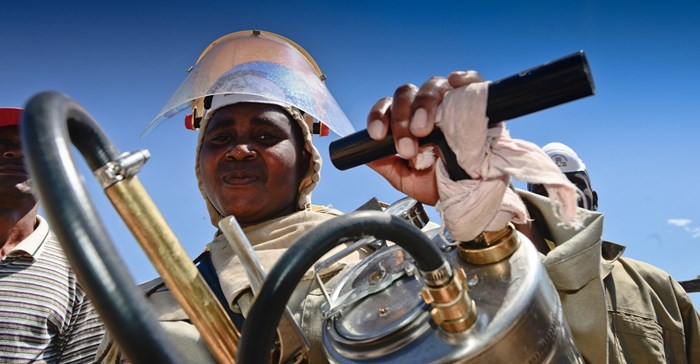
Subscribe & Follow
Advertise your job vacancies
Mozambique tackles Africa's smallest killer
Malaria still causes 1,2m deaths in Africa, so a new facility aimed at eliminating the disease in Mozambique by 2020 could have long-term advantages for the rest of the continent...

The sprayers are the true heroes in fighting malaria in Mozambique
Private-public partnership
Goodbye Malaria, in collaboration with the University of Pretoria and the Mozambique ministry of health, is opening a centre of excellence (CoE) in Namaacha, Mozambique, that will place the private-public partnership (PPP) at the forefront of malaria research and control.
Benefitting the whole continent
Besides setting a four-year deadline to rid the country of malaria, the knowledge, technology, training and methodology developed by the facility will be rolled out to the rest of Africa.
Sherwin Charles, CEO and co-founder of SA-based Goodbye Malaria, says that the PPP has placed ownership of the CoE in the hands of the government of Mozambique. Goodbye Malaria remains responsible for funding. While negotiations are underway with the Global Fund, the first phase has been sponsored by Nando’s.
Goodbye Malaria will also spearhead “franchising” the methodology, which optimises existing dwelling interiors spraying techniques with appropriate pesticides, beyond Mozambique’s borders.
Continuing the legacy
The CoE picks up where the Lebombo Spatial Development Initiative (LSDI), a joint anti-malaria initiative of the governments of South Africa, Swaziland and Mozambique, left off.
“It is exciting that we are now also working with the University of Pretoria, as the research to be conducted at the CoE by its academia and post-graduate entomology and public health students will supplement our operational expertise, says Charles.
Powerful weapon
Professor Tiaan de Jager, deputy dean: research, for the faculty of health sciences and director of the Centre for Sustainable Malarias Control, University of Pretoria, says that the CoE is a powerful weapon in the fight to eliminate malaria – which, despite significant inroads since 2000, still kills a child every 120 seconds. These past interventions have helped to reduce malaria mortality by 54% in Africa.
“Mosquito-borne diseases are still a significant cause of illnesses and deaths worldwide. Developments in the field of malaria will shape how we combat, for example, the emerging Zika virus,” says Prof. De Jager.
In addition, cross-border co-operation between endemic countries is essential, and innovation is crucial, "A transdisciplinary approach and active collaboration are need to reach our elimination goals," he explains.
The CoE also plans to lead a curriculum through which local people can earn a diploma related to eliminating malaria.
Methodology
There are two aspects to be considered in the elimination of malaria. The first is the (female) anopheles mosquito, which carries the malaria parasite and is killed with pesticide in a process known as indoor residual spraying (IRS). The second is the parasite itself. The mosquito and the parasite are known to develop resistance to the pesticide and medication, respectively, which has resulted in malaria resurging in some areas where it was through to have been wiped out.
In accepted methodology, the mosquito is known as the vector – giving rise to the term integrated vector management (IVM). Charles says that the CoE will focus on fine-tuning existing IRS knowledge to create an evolved IVM strategy that will prevent similar disease claw-backs in the future.
Socio-economic upliftment
For example, the strategy will also encompass socio-economic upliftment concurrent with IRS, and will include empowering communities to install doors and windows in their dwellings, and place pesticide-treated mosquito traps in air vents, to provide an extra ring of security.
Training sprayers
Goodbye Malaria has completed four IRSs in southern Mozambique since 2014, and are already training sprayers for the 2016 spray season.
The organisation recruits sprayers from the areas in which the IRSs are to take place. This creates local employment, and also fast-tracks the process as they are both familiar with the terrain and known to the community members.
True heroes
Spraying is an arduous task, says Charles. There is a specific technique that must be employed; the equipment is heavy; the protective clothing is cumbersome; and the temperatures can be searing.
“Goodbye Malaria will leverage our partners, resources, business experience and solidarity with international organisations such as the World Health Organisation and Roll Back Malaria, to achieve our stated goals. But the sprayers are the true heroes in the fight to finally say goodbye to malaria.”
Related
Tobacco industry targeting Africa’s youth as new market, warns UP expert 11 Mar 2025 Bridgewater and Global Citizen LED Economic Development Assembly coming to Abidjan on 9-10 October 13 Sep 2024 The causes making a difference in SA 4 Jun 2024 Malaria - we’ve barely scratched the surface 30 Apr 2024 Ogilvy South Africa invests in further growth of its digital creative hub, C2 Studio 26 Mar 2024 Vitality Health International teams up with Goodbye Malaria to save lives 25 Apr 2023







